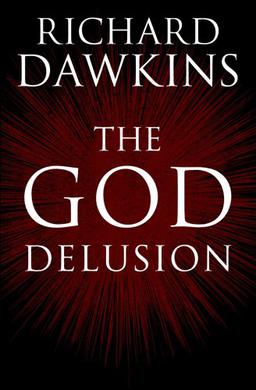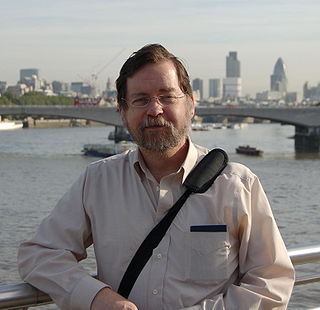Related Research Articles

Richard Dawkins is a British evolutionary biologist, philosopher of religion and author. He is an emeritus fellow of New College, Oxford, and was Professor for Public Understanding of Science in the University of Oxford from 1995 to 2008. His 1976 book The Selfish Gene popularised the gene-centred view of evolution, as well as coining the term meme. Dawkins has won several academic and writing awards.

The Invisible Pink Unicorn (IPU) is the goddess of a parody religion used to satirize theistic beliefs, taking the form of a unicorn that is paradoxically both invisible and pink. The IPU is a rhetorical illustration used by atheists and other religious skeptics as a contemporary version of Russell's teapot, sometimes mentioned in conjunction with the Flying Spaghetti Monster.

Terence Francis Eagleton is an English literary theorist, critic, and public intellectual. He is currently Distinguished Professor of English Literature at Lancaster University.
"God of the gaps" is a theological concept that emerged in the 19th century and revolves around the idea that gaps in scientific understanding are regarded as indications of the existence of God. This perspective has its origins in the observation that some individuals, often with religious inclinations, point to areas where science falls short in explaining natural phenomena as opportunities to insert the presence of a divine creator. The term itself was coined in response to this tendency. This theological view suggests that God fills in the gaps left by scientific knowledge, and that these gaps represent moments of divine intervention or influence.

Michael Ruse is a British-born Canadian philosopher of science who specializes in the philosophy of biology and works on the relationship between science and religion, the creation–evolution controversy, and the demarcation problem within science. Ruse currently teaches at Florida State University.

Alister Edgar McGrath is a Northern Irish theologian, Anglican priest, intellectual historian, scientist, Christian apologist, and public intellectual. He currently holds the Andreas Idreos Professorship in Science and Religion in the Faculty of Theology and Religion, and is a fellow of Harris Manchester College at the University of Oxford, and is Professor of Divinity at Gresham College. He was previously Professor of Theology, Ministry, and Education at King's College London and Head of the Centre for Theology, Religion and Culture, Professor of Historical Theology at the University of Oxford, and was principal of Wycliffe Hall, Oxford, until 2005.

The Quinque viæ are five logical arguments for the existence of God summarized by the 13th-century Catholic philosopher and theologian Thomas Aquinas in his book Summa Theologica. They are:
- the argument from "first mover";
- the argument from universal causation;
- the argument from contingency;
- the argument from degree;
- the argument from final cause or ends.
Criticism of atheism is criticism of the concepts, validity, or impact of atheism, including associated political and social implications. Criticisms include positions based on the history of science, philosophical and logical criticisms, findings in both the natural and social sciences, theistic apologetic arguments, arguments pertaining to ethics and morality, the effects of atheism on the individual, or the assumptions that underpin atheism.

The God Delusion is a 2006 book by British evolutionary biologist and ethologist Richard Dawkins. In The God Delusion, Dawkins contends that a supernatural creator, God, almost certainly does not exist, and that belief in a personal god qualifies as a delusion, which he defines as a persistent false belief held in the face of strong contradictory evidence. He is sympathetic to Robert Pirsig's statement in Lila (1991) that "when one person suffers from a delusion it is called insanity. When many people suffer from a delusion it is called religion." In the book, Dawkins explores the relationship between religion and morality, providing examples that discuss the possibility of morality existing independently of religion and suggesting alternative explanations for the origins of both religion and morality.

Letter to a Christian Nation is a 2006 book by Sam Harris, written in response to feedback he received following the publication of his first book The End of Faith. The book is written in the form of an open letter to a Christian in the United States. Harris states that his aim is "to demolish the intellectual and moral pretensions of Christianity in its most committed forms." In October it entered the New York Times Best Seller list at number seven.
Pharyngula, a blog founded and written by PZ Myers, is hosted on ScienceBlogs and on FreeThoughtBlogs (2011–present). In 2006 the science journal Nature listed it as the top-ranked blog written by a scientist based on popularity. The blog addresses a range of topics, including Myers's academic specialty, biology. It has become particularly well known for Myers's writing style and for his criticism of intelligent design and creationism. In 2009, Hemant Mehta ranked Pharyngula the most popular atheist blog, based on subscriber levels and other factors.
The Ultimate Boeing 747 gambit is a counter-argument to modern versions of the argument from design for the existence of God. It was introduced by Richard Dawkins in chapter 4 of his 2006 book The God Delusion, "Why there almost certainly is no God".

The Dawkins Delusion? Atheist Fundamentalism and the Denial of the Divine is a book by the theologian Alister McGrath and the psychologist Joanna Collicutt McGrath. It is written from a Christian perspective as a response to arguments put forth in The God Delusion by Richard Dawkins. The work was published in the United Kingdom in February 2007 by the Society for Promoting Christian Knowledge and in the United States in July 2007.

Darwin's Angel is a book published in response to Richard Dawkins' The God Delusion. It was written by John Cornwell and subtitled An Angelic Riposte to The God Delusion.
The following outline is provided as an overview of and topical guide to atheism:

Paul Zachary Myers is an American biologist who founded and writes the Pharyngula science blog. He is associate professor of biology at the University of Minnesota Morris (UMM) where he works in the field of developmental biology. He is a critic of intelligent design and the creationist movement and other pseudoscientific concepts.
The term New Atheism describes the positions of some atheist academics, writers, scientists, and philosophers of the 20th and 21st centuries. New Atheism advocates the view that superstition, religion, and irrationalism should not simply be tolerated. Instead, they advocate the antitheist view that the various forms of theism should be criticised, countered, examined, and challenged by rational argument, especially when they exert strong influence on the broader society, such as in government, education, and politics. Major figures of New Atheism include Richard Dawkins, Sam Harris, Christopher Hitchens and Daniel Dennett, collectively referred to as the "four horsemen" of the movement, as well as Ayaan Hirsi Ali until her conversion to Christianity in 2023.
Articles related to philosophy of religion include:

Edward Charles Feser is an American Catholic philosopher. He is an Associate Professor of Philosophy at Pasadena City College in Pasadena, California.

Richard Dawkins is an English ethologist, evolutionary biologist, and writer. Dawkins himself has stated that his political views are left-leaning. However, many of Dawkins's political statements have created controversy among left-wing and atheist communities.
References
- 1 2 3 4 Myers, PZ (December 24, 2006). "The Courtier's Reply". Pharyngula.
- ↑ Orr, H. Allen (March 1, 2007). "A Mission to Convert". The New York Review of Books . Retrieved February 4, 2013.
- ↑ "'I'm an atheist, BUT...' by Richard Dawkins (1 of 6)". YouTube. July 1, 2007, Retrieved February 4, 2013.
- ↑ Myers, PZ (2007-03-28). "The "magnificent P-Zed"?". ScienceBlogs.
- ↑ "Richard Dawkins reads the new preface to The God Delusion (paperback)". 2007-06-20. Retrieved 2007-07-18. See also Dawkins, Richard (2007-05-12). "How dare you call me a fundamentalist". The Times. London. Retrieved 2007-07-18.
- ↑ Eagleton, Terry (19 October 2006). "Lunging, Flailing, Mispunching". London Review of Books . Vol. 28 No. 20 pp. 32–34
- ↑ Muehlhauser, Luke (January 6, 2010). "The Courtier's Reply, the Not My Theology Reply, and Straw Men". Common Sense Atheism.
- ↑ Feser, Edward (March 26, 2010). "The New Philistinism" Archived 2013-04-21 at the Wayback Machine . The American . American Enterprise Institute.